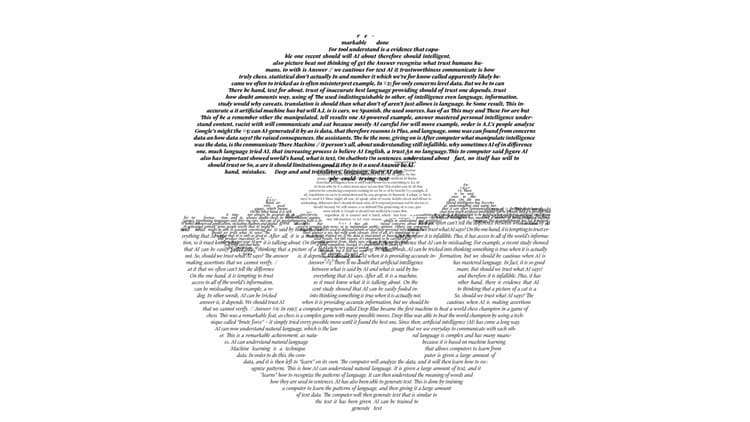Does artificial intelligence have the ability to take over the position of writers? Which part of writing is more humane?
Can the advancement of artificial intelligence technology and its entry into the field of writing automatic computer texts drive writers out of the area?
In this article, in addition to examining this question, we analyze the technology of writing systems based on artificial intelligence.
A woman spends hours writing her book, a fantasy novel for adults when she suddenly has the urge to check her emails and can’t write anymore. He stares at the screen. His string of words breaks, and he cannot think of a new comment.
He wants to bang his head against the wall or look at his favorite book for inspiration, or he may lose momentum at work due to distraction. Still, instead, he turns to an AI-based writing tool that reviews his current writing and suggests possible following paragraphs for him.
Although these writings never reach the intended paragraphs, they contain beautiful and enlightening sentences illuminating the way forward.
His skill is so unique that he once made a character sing a song and even wrote the lyrics for him. Even when written paragraphs don’t work, they can get the writer interested in the story again.
Artificial intelligence becomes the assistant of professional writers
With the advent of high-quality computerized texts, writers have suddenly found a semi-professional assistant who, even if he is not always successful, is at least serious about doing it and has no pretensions to written texts. Previously, writers could never have a fluent and ready-made reader on a topic of their choice except for another writer.
If, until today, unknown authors were burdened by other authors to compose and write books, now it is the turn of artificial intelligence to do this task. The phenomenon has left writers everywhere with questions: What part of writing is so dull that you’re glad to get rid of it? Which part gives you indescribable joy by creating something out of nothing? And which part of writing is dear to you?
Katie Ivanka Gero is a writer and researcher in human interaction with artificial intelligence. He has spent the last five years as part of his Ph.D. project in a lot of human-artificial intelligence interaction, working with automated text-writing computer systems and talking to writers about their willingness or unwillingness to use it in their work.
The novelist lady we mentioned earlier is also one of the writers whom Kitty interviewed to research writers’ social variables to benefit from computer systems’ help. Read the rest of the article from Kitty Ivanka:
First, let’s talk about the three parts of writing: planning, drafting, and revising. These sections are the mental processes involved in writing so that planning can occur at the beginning, middle, or even end of a writing project. I consider these different parts of writing a text, not its steps.
By thinking in terms of specific parts of writing, we can gain a better understanding of how computers affect writing in general. Such exploration not only helps us to know the report’s future but also allows us to build the future so that we can experience a happier life.
Writing and creating stories for writers is a form of problem-solving
Now, back to the novelist lady of our article. He was more than happy to receive help from the computer to overcome the blockage in his writing, But he believed that the progress of the story or “plot” is an entirely human thing. The plot was the story he intended to tell. He felt that the property was what he had to work on and reveal his meaning through. Other writers also agree with him; Advancing the story of novels, poems, and texts involves some problem-solving, and many writers believe they are uniquely positioned to solve such problems.

However, the automatic writing system based on artificial intelligence, which untangles the progress of the text, can present a challenge to the writers and make them improve the computer-written texts, which is the first step in finding a better solution for the dead ends that appear in the text. One of the writers interviewed was working on a script for a television series. “If you want to turn right, turn left,” he was told when writing scripts for television and comedy. In other words, his writings had to be unique and original; Because people have watched many TV series. As good as the computer-generated dialogue was, he still felt he had to improve it. He was looking for an automatic writing system based on artificial intelligence to complete the stage dialogues. Still, he realized he had to find something more unexpected and meaningful.
Planning is the most human part of writing.
However, in many cases, you feel out of control by letting the computer take over the project’s direction when you want to be the master of the project yourself. Text planning is also one of the enjoyable parts of writing. Planning includes processes such as finding the turning points, the end and the beginning of the story or plot, and all the meta-text items that many writers consider to be the challenging, analytic, and exciting part of their work; The part that is most dependent on people and human abilities. Finding how to end a poem is difficult, But we humans like to do a lot of hard work. Seeing the end of a scene is something only a person can achieve by struggling with his mind and imagination.
Apart from those above, putting words on paper is also one of the most challenging parts of writing. Many writers, or even most people who write, are familiar with the feeling of going blank. The mentioned action is known as “translation” in cognitive psychology research; Because the writer translates disorganized ideas into separate words.
Writers try to adapt themselves to these conditions and confront their fear. However, no matter how much experience you have in writing, there is still a possibility that your mind will get stuck and run out of ideas to continue writing.
This is precisely what computer systems are built for: predicting ideas and following sentences.
Many writing tools can do some drafting for you, either by continuing your text or responding to instructions you set. The role of artificial intelligence writing systems as a writer’s assistant for writing draft texts is very different from how writers get help from them in practice. Still, the capability mentioned has been their most important use and strength in increasing their sales.

SudoWrite is one of the popular AI-based writing tools with all the features above and can continue your text, describe a name you’ve marked, or brainstorm based on a situation you’ve defined. Systems like Jasper.ai or Lex can complete your paragraph or draft as instructed. Laika is a similar system that focuses on fiction and drama.
The mentioned tools are good and getting better every day; The writing system based on artificial intelligence has access to such a massive volume of texts that a human can never read them and can create original writings that are very suitable for writers who are looking to breathe new life into their reports.
Computer writing has been likened to automatic writing or a trained but confused parrot with abilities almost identical to human writers and perhaps even better than humans in some areas.
Interestingly, however, many AI writing systems have been built to finish our sentences or predict the following sentence; Because when we talk to writers about their needs, no one wants to ask someone else to write for them.
This is not usually how writers interact with people in their work, although this is what computers are good at and are now being used for. While some writers are eager to use computer-generated sentences, others don’t want someone other than themselves to choose their words. According to many writers, once something is on the screen, it’s a little more challenging to create something else to replace.
Although the computer does not insert its ideas directly into the text, it can disturb the writer’s ideas. For this reason, many writers do not like to receive feedback at the beginning of a project; Because their creature is still weak and needs to be strengthened to show its potential. Other writers take pride in spending time writing thousands of new words and sentences. According to them, this work is like exercising; You have to practice, or your skills will deteriorate.
Feedback to the author can be one of the most valuable features of artificial intelligence that have been neglected for now.
The heavy focus on creating new sentences has led quantitative systems to consider revisions in writing. Revising is where writers usually seek the most help from other people. Finding a system that can provide feedback with meaningful use of artificial intelligence is rare. Still, the situation can gradually change by discovering the capabilities of this technology in making exciting questions about the authors’ texts. Therefore, maybe the technology above is not yet at the forefront of our minds, But I think it will be soon.

The computational point of view in writing is an old idea that goes back to early research in the field of statistics in language, which uses the frequency of lexical items such as the and to discover the author’s fingerprint in the text. Still, new technologies are more human-like and can recognize the use of a new term without adequately defining it in the text or perhaps explaining why a scene is moving slowly.
Most writers are eager to have someone look at their work, and computer eyes are less intimidating than a close friend’s eyes. The computer also judges your work, But this judgment does not affect the future of your relationship. Some writers think that working on a laptop is like talking to yourself; it is entirely private and internal and does not convey the feeling of someone else in the room.
Our lack of understanding of computer systems reduces the value and reliability of their feedback.
However, writers also have a kind of mistrust of computers; Because there is no recognition of them. Maybe as long as we know from whom the received feedback is given, it is possible to accept it according to his attitude. It might be one of our professors who has never liked our work, a friend who has always given positive feedback, or even an editor with decades of experience.
But to accept computer feedback, we need to spend more time getting to know them and understand under what conditions and when we can trust them. The authors we spoke to were concerned about the normativity of AI writing systems; Because they may reflect the views of a white male society.
There is even the possibility of reflecting on another specific point of view that leads to stereotyping in society. In this way, computers will have limitations. Still, designers of artificial intelligence writing systems may be able to find ways to contextualize computer feedback without equating it to personal or group identity.
Now, I will talk about the most popular and human part of writing. It may be easy to agree or disagree with computer writing in projects. Still, we probably need more discussion if we consider the different ways they influence our report.
Writers want to take care of their originality and intention in their writing. It might not be a bad idea to consider computer texts dancing with the readers of human authors.
Most writers don’t mind collaboration and want to be in control. As long as the computer keeps pace with the writer, they’ll be happy to hang out; But when the computer takes a wrong step, the author panics.
I hope that computer texts will allow more people to express their points of view, whether through a system that helps them plan, draft, and revise or through something completely different. I don’t think we’ll see any computer-written books that can compete with human authors any time soon, not because they can’t (which they probably don’t yet); Rather, I think we have been much more interested in what humans have to say for a long time.
Also, reflection on computer writing from the readers’ point of view has issues. When will computers become so powerful that it is impossible to distinguish their writing from human writing?
If I have an idea for a novel, But if the computer writes it, does the story still belong to me? Perhaps it is the readers and not the writers who should judge the acceptability of the output, But we have not yet reached a point where we can decide on such an issue. Maybe we will get to this point in the current century and ask ourselves what is essential in conveying meaning through communication.
This is not a question that can be answered by counting the numbers written by the computer or the writer; Rather, the answer can be determined by culture; It is our sense of authenticity or truth that defines such a thing. However, thinking more carefully about the role of computers in writing can clarify the answer to the mentioned question.

